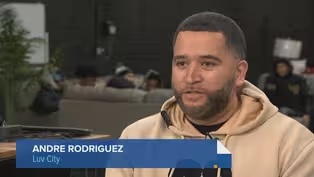Chicago Tonight: Latino Voices
Schools Under Pressure to Cut DEI Programs or Lose Funding
Clip: 2/20/2025 | 9m 28sVideo has Closed Captions
President Donald Trump's crackdown on diversity policies is affecting schools.
In a letter last week, the U.S. Department of Education gave school systems and universities two weeks to get rid of programs focusing on diversity, equity and inclusion.
Problems playing video? | Closed Captioning Feedback
Problems playing video? | Closed Captioning Feedback
Chicago Tonight: Latino Voices is a local public television program presented by WTTW
Chicago Tonight: Latino Voices
Schools Under Pressure to Cut DEI Programs or Lose Funding
Clip: 2/20/2025 | 9m 28sVideo has Closed Captions
In a letter last week, the U.S. Department of Education gave school systems and universities two weeks to get rid of programs focusing on diversity, equity and inclusion.
Problems playing video? | Closed Captioning Feedback
How to Watch Chicago Tonight: Latino Voices
Chicago Tonight: Latino Voices is available to stream on pbs.org and the free PBS App, available on iPhone, Apple TV, Android TV, Android smartphones, Amazon Fire TV, Amazon Fire Tablet, Roku, Samsung Smart TV, and Vizio.
Providing Support for PBS.org
Learn Moreabout PBS online sponsorship>> School systems and universities across the country are facing an ultimatum, eliminate their diversity programs or lose federal funding.
In a letter on Friday, the Department of Education gave school systems and universities 2 weeks to give it to get rid of programs focusing on diversity, equity and inclusion or known as D supporters of the orders say it's an effort to get schools to follow laws against discrimination.
But advocates worry that support for students of color could get cut.
Here with more with the potential impact, our in the mat on the Wolf.
See you at those.
The dei consulting firm and Jeffrey Schwab, senior counsel at Liberty Justice Center and Non partisan look at the litigation firm.
Thank you both for joining us.
I want to start off as mentioned.
The Trump administration is giving schools a deadline to eliminate These Dei dei programs.
Jeffrey, you know, what was your first reaction to this?
>> think in the main the letter just reiterate current law racial discrimination and universities is illegal and it emphasizes that the Trump administration is interested in enforcing it response to the 2023 Supreme Court case, students for fair admissions versus Harvard.
And that case held title 6 and the Equal Protection Clause made affirmative action programs illegal and unconstitutional.
So the in the letter just says that the Trump administration is going to make sure that that law is in and the the what are your thoughts?
>> Along the same lines, it is a broad and general statement.
And when we think about higher education institutions, they're really awaiting guidance on what will follow as a result of this letter.
So we have 8 days to see what this will actually mean.
But I think it's in keeping with what this administration overall has taken as its position, which is an anti DIA agenda and talking about that, what types of programs could be impacted under this order.
>> So if there, you're in closely to the Supreme Court ruling, we would only be looking at admissions when thinking about colleges are higher education.
But the letter its office much broader.
>> And encompasses everything from kindergarten.
2 middle school high school and state agencies that are in the education space.
So it could mean a lot of different things based on the language in the letter itself, it could mean multicultural programs that could mean mentorship programs.
That could graduation events that are targeted at specific groups.
It could mean a variety of access programs that are tied to racial identity, ethnic identity or national origin.
>> Jeffrey Research has shown students of color of color are often underrepresented in higher education.
You know, what are the potential issues with academic support program exclusively design for specific groups.
>> I think it's important to note that the goals of education inclusion are not necessarily mutually exclusive with the Supreme Court's decision in the students for Fair Admissions case.
If if we're concerned about people that are underrepresented in schools universities, that there's a variety of other avenues that we can take.
We can focus on people of limited means and people of limited means is over, represented in certain racial groups.
Then in theory that would help.
Focus that would help those racial groups.
also we can focus on things like school choice allowing kids that are K through 12 education to not be limited to their schools and have the opportunity have schools outside and that hopefully would allow them a better opportunity to learn and get colleges that they prefer.
>> only that would use it to some who think that grams should just be based or did not consider race.
So I think fundamentally ignores the other elements of being part of a campus environment or a school environment.
>> When we think about multicultural center is one of my colleagues in this space to know my thumb autos who studied at Loyola Law in terms of getting his PhD, looked up permanent residence.
And one of the things that he noted was that they were less likely to feel a sense of belonging on campus because of a lack of shared cultural identities.
And that programming that was specifically geared towards, let's say up and Hispanic identity, help them feel more integrated into the campus community and also give them access to resources and tools that they wouldn't have had available to them.
And I think when we are considering dental students in particular, we have to also consider that using lesser means are low income as a proxy ignores some really important challenges like language, for example, a lot of these programs that are supposed to be in this category race or national origin or ethnicity actually highlight language, make sure that materials are translated into languages.
Some of the arguments about these graduation events have been a challenge to because those have been done in a bilingual fashion, which has been important in terms of really bringing the community of the students into the fold.
Jeffrey, what are your thoughts on what she's saying?
>> Well, I don't think that I guess what I would say is it is unclear what the Trump administration, how they will enforce.
It did promise that sometime in the future they would provide further guidance.
And so it's not clear whether the enforcement mechanisms be against things like language based learning things like that.
doesn't seem to me that that.
Necessarily violates the Supreme Court's decision and students for fair housing.
But it also is important to note that this is the Supreme Court's Kate, the decision and students for fair housing.
That's the law.
That's how they interpret the law.
And I think many people can agree that recent response I think Vice President Vance that that we shouldn't get to pick and choose which Supreme Court cases we're going to follow based on whether we like the outcome and I want to bring feel something else report from the Latino Civil Rights Needles U.S. says.
>> The large number of students who at some point consider taking leaves of absence from school, demonstrates the impact of various barriers.
Our study found that's 66% of Latino college students consider leaving school at some point and that 34 actually did leave Jeffrey without program to support students of color in school.
How do we eliminate those barriers to entry retention, especially in higher education?
Would you say?
>> Well, I mean, I don't have all the answers, but I think there are ways that are not race-based that can focus on helping students that are having trouble.
I don't think that the race pace thing would prevent things helping people that speak late speak a different language to as first language.
I think that would be perfectly consistent with the Supreme Court's case.
So I think there's lots of ways other than just focusing on race and racial discrimination that can help people of all different backgrounds and that are struggling with their educational opportunities do.
What do you make of this main concern is that there are any precedent established.
So if we look at the University of Texas at Austin.
>> The response last year based on state law fall requirements met that their multicultural center closed and monarch, which was their center specifically focused on undocumented students closed and that avenue to access to resources to support which, by the way, both of those centers were not closed off to people of different groups.
But there was such a fear of losing federal funding and state funding.
And there is such a desire to align to a certain agenda that we had students who were counting on the support system that then was removed.
And so what I think about a letter like this is again, not sure that it's going to lead to everything that is broadly defined in the letter.
But that institutions are going to be afraid of losing their funding and pause programs that students are using right now and using to great effect.
So you're already seeing there's been universities are schools changing their wording?
>> We're seeing at least in U.S. we consult with a number of universities.
What we're seeing is that their programs pass.
So they're very concerned not knowing what's going to happen in the future.
And so our directors of, for example, one of our directors of multi cultural center has completely suspended the program encounter through the end of February, waiting for a February 28th roll around because there's also concerns about job loss and whether they're going to lose their staff if they take a wrong step.
And if only have a couple seconds, but I want to ask, do you think it's fair to put schools under such a tight constrained to comply with these new rules?
>> think it's worthwhile noting that it's in the under regulation that that's been the policy of the United States government to not immediately take away funding for violations, but to consult with hoping for voluntary, hoping for voluntary compliance.
And I would
How Chicago's Restaurant Owners Are Preparing for Deportations
Video has Closed Captions
Clip: 2/20/2025 | 8m 3s | The restaurant industry is fueled by immigrant workers. (8m 3s)
Inside a Local Organization Helping Teens Tell Their Stories
Video has Closed Captions
Clip: 2/20/2025 | 3m 44s | Luv City is empowering teens to challenge the narratives about their communities. (3m 44s)
Providing Support for PBS.org
Learn Moreabout PBS online sponsorship
- News and Public Affairs

Top journalists deliver compelling original analysis of the hour's headlines.

- News and Public Affairs

FRONTLINE is investigative journalism that questions, explains and changes our world.












Support for PBS provided by:
Chicago Tonight: Latino Voices is a local public television program presented by WTTW

